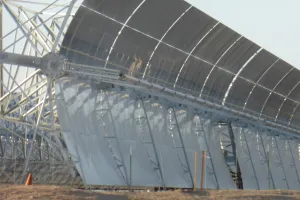Healthy natural areas play a critical role in absorbing greenhouse gases and stabilizing the climate. A utility-scale solar electric project in the desert of San Bernardino County was fast-tracked through the CEQA process and now serves to slow climate change on two fronts: by increasing the share of renewable energy in California’s electricity market, and by protecting the surrounding natural habitat and its cohort of native species.
The Abengoa Mojave Solar Project generates enough electricity to power 88,000 households a year. As a large-scale solar project, it was eligible for an expedited CEQA process. Outcomes of this process included a program to assure worker safety and fire protection in this high wildfire-risk area; an assessment of potential impacts to low-income and communities of color; and measures to mitigate impacts to biological resources. Significantly, the project established and funded a conservation easement on the surrounding land.
Source: Source: BAE Urban Economics (2016). CEQA in the 21st Century. P. 36.
Photo credit: Z22 , CC BY-SA 3.0

